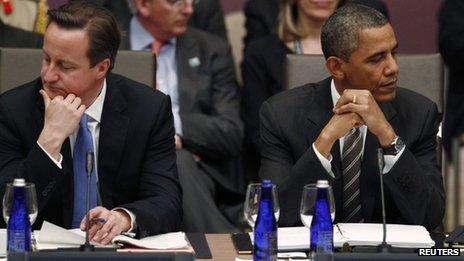Is Nato's Afghan timetable a milestone or millstone?
- Published
- comments

A British official said it was unrealistic to think Afghanistan would be completely secure by the end of 2014
The Chicago Nato summit marked a "milestone". That was the word chosen to spin the summit.
It is a more than usually evocative and revealing word. "Milestone" makes me think not of the end of a journey, but of the long slog still ahead. Nearly there, but not quite.
It looks like a tombstone and sounds like a millstone.
The Nato leaders would have given their game away a little more had they chosen an image that implied more of an unstoppable momentum. A runaway truck or a falling boulder. Because that is what this summit was really about.
There will be a handover of combat operations to Afghan control next year. While the military brass interpret this simply as not being in the lead in fighting, the politicians go a little further, suggesting Nato will only play a "support" role.
And then, on 31 December 2014, all Nato combat operations will stop. No ifs and no buts. No conditions on the ground, no generals, and no wider political changes will stop that.
That much had already been decided, but this summit was a public display of inevitability. Future leaders are tied to the timetable.
It might be quite awkward for a President-elect Mitt Romney to turn around after November's US presidential election and tell his Nato allies that they are staying in Afghanistan a bit longer after all. He would not have any allies with him - or many voters.
'Ultimate nightmare'
The idea of an orderly progress towards a reasonable end state was paramount. But occasional fractures here gave a glimpse of the messy reality that lies beyond.
First, the French. There would be no rush for the exit, we were told. The policy of "in together, out together" would stand.
No matter that the new French president had made it quite clear all his troops would come home by the end of this year.
He did not budge or fudge, but Nato's leaders rather ignored him and just hoped no-one else would follow his lead and start elbowing others out of the way in their desire to get home.
Then there was Pakistan. By the end of the meeting everyone thought there was an end in sight to the row about supply lines. But it underlined a couple of important points.
Pakistan is an awkward ally, when it deserves that description at all. It is by no means on side and while Nato moves into its new and as yet ill-defined post-2014 role, it will still be a neighbour to Afghanistan.
It is hard to see how Pakistan will have stopped being a safe-haven for the Taliban and a source of instability to Afghanistan.
The focus on the long and difficult supply lines was also a reminder of how vulnerable Nato will be as it trundles thousands of tons of equipment home, and men and materiel queue up to get out.
Then there was us. The British have been perfectly behaved allies in American eyes, but one British official somewhat gave the game away.
He said the absolute and obvious truth when he told the political press pack: "It is unrealistic to assume that Afghanistan is going to be completely secure and there is no possibility of a terrorist threat re-emerging in some part of it."
But that is the ultimate nightmare: that the allies will quick-march home, past the milestones, in time to meet the date ringed in the calendar, only to find the very threat they fought for 13 years to eliminate emerges once more.